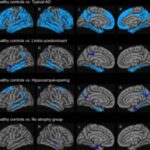Treating Alzheimer’s disease using precision medicine is gaining attention and significance for several compelling reasons:
- Heterogeneity of Alzheimer’s Disease: Alzheimer’s disease is not a uniform condition. It exhibits significant heterogeneity in its presentation, progression, and underlying molecular mechanisms among individuals. Precision medicine takes this heterogeneity into account, recognizing that each person’s Alzheimer’s journey is unique. By tailoring treatments to an individual’s specific characteristics, we can potentially achieve more effective outcomes.
- Personalized Treatment Plans: Precision medicine aims to create personalized treatment plans by considering an individual’s genetic, environmental, lifestyle, and clinical factors. This approach allows for the customization of interventions to address the specific drivers and factors contributing to a person’s Alzheimer’s disease. For example, genetic testing can identify risk factors or specific gene mutations that may guide treatment decisions.
- Early Detection and Intervention: Alzheimer’s disease often develops over several years or even decades before noticeable cognitive symptoms appear. Precision medicine can enable early detection through biomarker analysis, which can identify individuals at risk before significant brain damage occurs. Early intervention can be more effective in slowing or modifying the course of the disease.
- Targeted Therapies: Precision medicine enables the development of targeted therapies that address the underlying causes or mechanisms of Alzheimer’s disease in a particular individual. For example, some individuals may have abnormal protein accumulations (e.g., beta-amyloid or tau) in their brains, and therapies targeting these specific pathologies may be more effective for them.
- Reduced Adverse Effects: A one-size-fits-all approach to Alzheimer’s treatment may result in unnecessary side effects or inadequate responses for some patients. Precision medicine aims to minimize these risks by tailoring treatments to the individual, potentially leading to better tolerability and adherence to treatment.
- Research Advancements: Precision medicine generates valuable data and insights that can inform ongoing research efforts. By analyzing genetic, molecular, and clinical data from diverse Alzheimer’s patients, researchers can identify subtypes of the disease and develop more targeted interventions.
- Cost-Effective Care: While precision medicine may involve more upfront costs for genetic testing and personalized assessments, it has the potential to be cost-effective in the long run by reducing ineffective treatments, hospitalizations, and long-term care costs associated with the disease.
- Ethical Considerations: Treating Alzheimer’s with precision medicine respects the autonomy and dignity of patients by offering them tailored treatment options based on their unique characteristics and preferences.
Dr. Devi has found Alzheimer’s disease and other dementias are spectrum diseases- affecting different people differently. With proper diagnosis and treatment, many patients with Alzheimer’s can live and function as productive members of society. Alzheimer’s disease is often misunderstood and feared but a third of cognitively normal elders have Alzheimer’s pathology. The equation “Brain Reserve/Pathology = Functioning” applies in thinking about functioning as a person with Alzheimer’s disease or another dementia. Bolstering brain reserve and optimizing brain and general health is key to symptom postponement, the key to healthy brain aging and prevention of dementia and Alzheimer’s disease.
“Gayatri Devi has developed a profoundly important and new view of Alzheimer’s disease, explaining for the first time that it is not an ‘all-or-nothing’ diagnosis but must be calibrated for each affected individual. Many patients can continue productive, fulfilling lives for an indefinite period of time. Dr. Devi is brilliantly trained in a variety of disciplines to diagnose and bring relief to patients with neurological disorders. She is the first specialist to whom most of us turn for solving complex diagnostic and therapeutic issues.” Marianne J. Legato, MD, PhD (hon) Emerita Professor of Clinical Medicine, Columbia University Adjunct Professor of Medicine, Johns Hopkins

“I call Alzheimer’s ‘the Doubting Disease.” -Mike, a patient
Patients doubt themselves, and their families, caregivers, and physicians doubt them also. Maintaining confidence is half the battle.
Dr. Devi’s 10 Rules for Living Well With Alzheimer’s Disease:
- Maintain Confidence
- Treat appropriately
- Exploit brain plasticity
- Control medical conditions
- Treat depression
- Support the caregiver
- Skip or have a small dinner
- Exercise aerobically
- Stay social
- Make a living will


“I brought my mother to see Dr. Devi early on in my mom’s journey with Alzheimer’s. Dr. Devi provided not only the absolute forefront of treatment options, she treated my mother as a lifelong friend. Visiting the office was always a pleasure because we were made to feel at home. My mother’s life was not just lengthened but more importantly substantially- enriched by the expertise that Dr. Devi shared with us. I cannot emphasize enough that my mother’s good years were lengthened due to her treatment with Dr. Devi. If anyone I know has Alzheimer’s, I send them first to Dr. Devi, and advise that they read all of her books. She is the absolute tops in the field.” Carolyn McQuade










